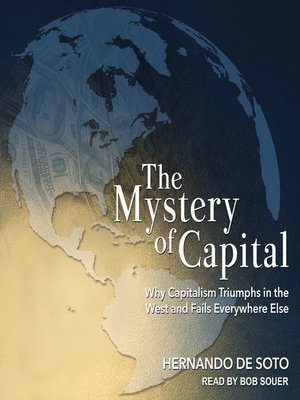The Mystery of Capital
audiobook (Unabridged) ∣ Why Capitalism Triumphs in the West and Fails Everywhere Else
By Hernando de Soto

Sign up to save your library
With an OverDrive account, you can save your favorite libraries for at-a-glance information about availability. Find out more about OverDrive accounts.
Find this title in Libby, the library reading app by OverDrive.



Search for a digital library with this title
Title found at these libraries:
| Library Name | Distance |
|---|---|
| Loading... |
A renowned economist's classic book on capitalism in the developing world, showing how property rights are the key to overcoming poverty.
"The hour of capitalism's greatest triumph," writes Hernando de Soto, "is, in the eyes of four-fifths of humanity, its hour of crisis." In The Mystery of Capital, the world-famous Peruvian economist takes up one of the most pressing questions the world faces today: Why do some countries succeed at capitalism while others fail?
In strong opposition to the popular view that success is determined by cultural differences, de Soto finds that it actually has everything to do with the legal structure of property and property rights. Every developed nation in the world at one time went through the transformation from predominantly extralegal property arrangements, such as squatting on large estates, to a formal, unified legal property system. In the West we've forgotten that creating this system is what allowed people everywhere to leverage property into wealth. This persuasive book revolutionized our understanding of capital and points the way to a major transformation of the world economy.
"The hour of capitalism's greatest triumph," writes Hernando de Soto, "is, in the eyes of four-fifths of humanity, its hour of crisis." In The Mystery of Capital, the world-famous Peruvian economist takes up one of the most pressing questions the world faces today: Why do some countries succeed at capitalism while others fail?
In strong opposition to the popular view that success is determined by cultural differences, de Soto finds that it actually has everything to do with the legal structure of property and property rights. Every developed nation in the world at one time went through the transformation from predominantly extralegal property arrangements, such as squatting on large estates, to a formal, unified legal property system. In the West we've forgotten that creating this system is what allowed people everywhere to leverage property into wealth. This persuasive book revolutionized our understanding of capital and points the way to a major transformation of the world economy.







